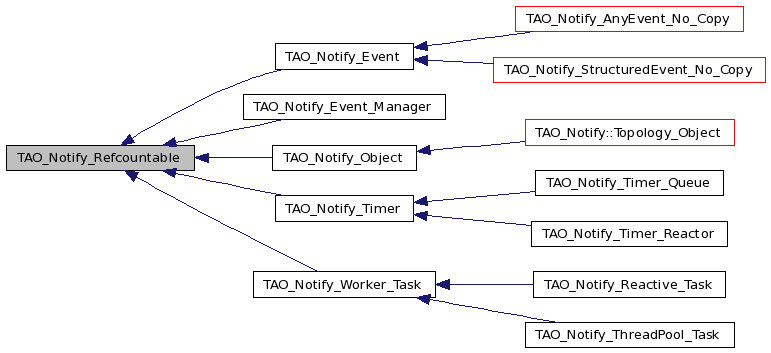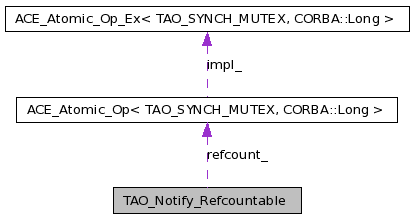Thread-safe refounting, calls the <release> method when refcount falls to 0. More...
#include <Refcountable.h>


Public Types | |
| typedef TAO_Notify_Refcountable_Guard_T < TAO_Notify_Refcountable > | Ptr |
Public Member Functions | |
| TAO_Notify_Refcountable (void) | |
| Constructor. | |
| virtual | ~TAO_Notify_Refcountable () |
| CORBA::ULong | _incr_refcnt (void) |
| CORBA::ULong | _decr_refcnt (void) |
Private Member Functions | |
| virtual void | release (void)=0 |
| The release method is called when the refcount reaches 0. | |
Private Attributes | |
| ACE_Atomic_Op< TAO_SYNCH_MUTEX, CORBA::Long > | refcount_ |
Thread-safe refounting, calls the <release> method when refcount falls to 0.
The refcount is initialized to 0. When an instance of a derived class becomes owned by a managed pointer (Refcountable_Guard_T) the reference count becomes non-zero.
Instances declared on the stack should always have a refcount of zero.
A method that creates or simply returns an instance of Refcountable should not increment the reference count. It is the responsibility of the client to increment the reference count (take ownership or guard against deletion). The client cannot know if the method will or will not incr the refcount on its behalf.
Use Refcountable_Guard_T or similar service to guarantee the exception safe direct pairing of increments and decrements. Avoid calling _incr_refcnt and _decr_refcnt.
Definition at line 60 of file Refcountable.h.
Reimplemented in TAO_Notify_Event_Manager, TAO_Notify_Timer, TAO_Notify_Timer_Queue, TAO_Notify_Timer_Reactor, and TAO_Notify_Worker_Task.
Definition at line 63 of file Refcountable.h.
| TAO_Notify_Refcountable::TAO_Notify_Refcountable | ( | void | ) |
| TAO_Notify_Refcountable::~TAO_Notify_Refcountable | ( | ) | [virtual] |
Destructor public for stack allocated instances
Definition at line 74 of file Refcountable.cpp.
{
#if ( TAO_NOTIFY_REFCOUNT_DIAGNOSTICS != 0 )
TAO_Notify_Tracker::Entry e = TAO_Notify_Tracker::get_instance().find( this );
if ( e.obj != 0 )
{
ACE_DEBUG ((LM_DEBUG,"object:%x %s(%d) with refcount:%d destroyed incorrectly.\n",
e.obj, e.class_name, e.obj->ref_id_, e.obj->refcount_.value() ));
if ( e.obj != this || e.obj->ref_id_ != this->ref_id_ )
{
ACE_DEBUG ((LM_DEBUG, " with an ID mismatch %x->%d != %x->%d!\n",
this, ref_id_, e.obj, e.obj->ref_id_));
}
TAO_Notify_Tracker::get_instance().remove( this );
}
#endif
CORBA::ULong refcount = this->refcount_.value();
ACE_ASSERT( refcount == 0 );
ACE_UNUSED_ARG(refcount);
}
| CORBA::ULong TAO_Notify_Refcountable::_decr_refcnt | ( | void | ) |
Definition at line 118 of file Refcountable.cpp.
{
CORBA::Long refcount = --this->refcount_;
if (TAO_debug_level > 1 )
{
ACE_DEBUG ((LM_DEBUG,"object:%x decr refcount = %d\n", this, refcount ));
}
ACE_ASSERT(refcount >= 0);
if (refcount == 0)
{
#if ( USE_TAO_NOTIFY_TRACKER != 0 )
TAO_Notify_Tracker::get_instance().remove( this );
#endif
this->release ();
}
return refcount;
}
| CORBA::ULong TAO_Notify_Refcountable::_incr_refcnt | ( | void | ) |
This method sigantures deliberately match the RefCounting methods required for ESF Proxy Public for bridge implementations and various guard classes
Definition at line 98 of file Refcountable.cpp.
{
CORBA::Long refcount = ++this->refcount_;
if (TAO_debug_level > 1 )
{
ACE_DEBUG ((LM_DEBUG,"object:%x incr refcount = %d\n", this, refcount ));
}
#if ( TAO_NOTIFY_REFCOUNT_DIAGNOSTICS != 0 )
// Stack-instantiated-non-servants should never have _incr_refcnt called.
// We do not care about stack-instances. Stack-instantiated servants break
// the tracker.
if ( refcount == 1 )
{
TAO_Notify_Tracker::get_instance().add( this );
}
#endif
return refcount;
}
| virtual void TAO_Notify_Refcountable::release | ( | void | ) | [private, pure virtual] |
The release method is called when the refcount reaches 0.
Implemented in TAO_Notify_Event_Manager, TAO_Notify_Reactive_Task, TAO_Notify_Timer_Queue, and TAO_Notify_Timer_Reactor.
ACE_Atomic_Op<TAO_SYNCH_MUTEX, CORBA::Long> TAO_Notify_Refcountable::refcount_ [private] |
Use a signed counter so that we can more easily detect boundary conditions such as too many _decr_refcnt() calls.
Definition at line 87 of file Refcountable.h.
 1.7.0
1.7.0